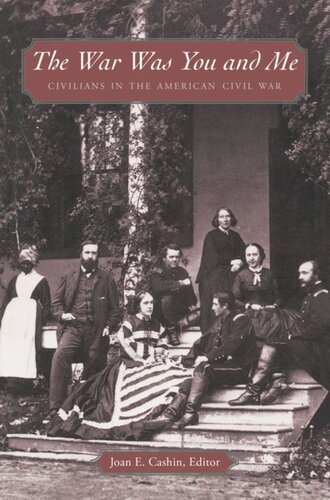

Most ebook files are in PDF format, so you can easily read them using various software such as Foxit Reader or directly on the Google Chrome browser.
Some ebook files are released by publishers in other formats such as .awz, .mobi, .epub, .fb2, etc. You may need to install specific software to read these formats on mobile/PC, such as Calibre.
Please read the tutorial at this link: https://ebookbell.com/faq
We offer FREE conversion to the popular formats you request; however, this may take some time. Therefore, right after payment, please email us, and we will try to provide the service as quickly as possible.
For some exceptional file formats or broken links (if any), please refrain from opening any disputes. Instead, email us first, and we will try to assist within a maximum of 6 hours.
EbookBell Team

4.7
16 reviewsThough civilians constituted the majority of the nation's population and were intimately involved with almost every aspect of the war, we know little about the civilian experience of the Civil War. That experience was inherently dramatic. Southerners lived through the breakup of basic social and economic institutions, including, of course, slavery. Northerners witnessed the reorganization of society to fight the war. And citizens of the border regions grappled with elemental questions of loyalty that reached into the family itself.
These original essays--all commissioned from established scholars, based on archival research, and written for a wide readership--recover the stories of civilians from Natchez to New England. They address the experiences of men, women, and children; of whites, slaves, and free blacks; and of civilians from numerous classes. Not least of these stories are the on-the-ground experiences of slaves seeking emancipation and the actions of white Northerners who resisted the draft. Many of the authors present brand new material, such as the war's effect on the sounds of daily life and on reading culture. Others examine the war's premiere events, including the battle of Gettysburg and the Lincoln assassination, from fresh perspectives. Several consider the passionate debate that broke out over how to remember the war, a debate that has persisted into our own time.
In addition to the editor, the contributors are Peter W. Bardaglio, William Blair, W. Fitzhugh Brundage, Margaret S. Creighton, J. Matthew Gallman, Joseph T. Glatthaar, Anthony E. Kaye, Robert Kenzer, Elizabeth D. Leonard, Amy E. Murrell, George C. Rable, Nina Silber, Mark M. Smith, Mary Saracino Zboray, and Ronald J. Zboray. Together they describe the profound transformations in community relations, gender roles, race relations, and culture wrought by the central event in American history.